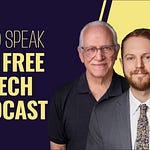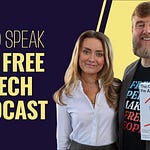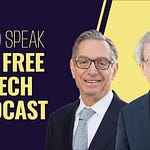Yale Law professor Keith Whittington answers this timely question and more in his new book, “You Can’t Teach That! The Battle over University Classrooms.” He joins the podcast to discuss the history of academic freedom, the difference between intramural and extramural speech, and why there is a “weaponization” of intellectual diversity.
Keith E. Whittington is the David Boies Professor of Law at Yale Law School. Whittington’s teaching and scholarship span American constitutional theory, American political and constitutional history, judicial politics, the presidency, and free speech and the law.
Timestamps:
00:00 Intro
02:00 The genesis of Yale’s Center for Academic Freedom and Free Speech
04:42 The inspiration behind “You Can’t Teach That!”
06:18 The First Amendment and academic freedom
09:29 Extramural speech and the public sphere
17:56 Intramural speech and its complexities
23:13 Florida’s Stop WOKE Act
26:34 Distinctive features of K-12 education
31:13 University of Pennsylvania professor Amy Wax
39:02 University of Kansas professor Phillip Lowcock
43:42 Muhlenberg College professor Maura Finkelstein
47:01 University of Wisconsin La-Crosse professor Joe Gow
54:47 Northwestern professor Arthur Butz
57:52 Inconsistent applications of university policies
01:02:23 Weaponization of “intellectual diversity”
01:05:53 Outro
Show notes:
“Speak Freely: Why Universities Must Defend Free Speech” Keith Whittington (2019)
“You Can't Teach That!: The Battle Over University Classrooms” Keith Whittington (2023)
AAUP Declaration of Principles on Academic Freedom and Tenure (1915)
AAUP Statement of Principles on Academic Freedom and Tenure (1940)
“Kinsey” (2004)
Stop WOKE Act, HB 7. (Fla. 2022)
Indiana intellectual diversity law, S.E.A. 354 (Ind. 2022)
“Tinker v. Des Moines Independent Community School District” (1969)
Editor's note: This abridged transcript highlights key discussions from the podcast. It has been lightly edited for length and clarity. Please reference the full unedited transcript for direct quotes.
Academic freedom, the First Amendment, and classroom speech
NICO PERRINO, HOST: Was there a misconception surrounding what speech in the classroom is that you felt needed to be rectified with this book?
KEITH WHITTINGTON, GUEST: I think there are misconceptions about what the scope of freedom is in a classroom context. There are also questions about why we should care about the kind of freedom that we have enjoyed over the last several decades, at least in university teaching. I think there are real challenges in an environment where state legislatures are getting involved with statutory changes affecting classroom speech. That in turn is going to create litigation, which FIRE’s been involved with.
There’s real pressure on judges to try to think through what kinds of academic freedom protections are really built into the First Amendment, how to encapsulate those kinds of protections in doctrine. There’s a real need to think through that process very carefully now. My book, in part, is an effort both to try to explain why academic freedom and freedom of teaching in classrooms matters and what kind of appropriate limitations there are. But if we’re going to institutionalize it, including through constitutional law, how do we do that in a way that doesn’t create more problems than it solves.
PERRINO: You have the First Amendment, Congress shall make no law abridging the freedom of speech. You have academic freedom, this concept which is often conflated or seem to be the same thing as the First Amendment. Then you have classroom speech, which involves some aspect of academic freedom. What is the difference between the three, if any?
WHITTINGTON: Part of what I urge in the book is that as judges think about what kind of First Amendment grounding might academic freedom have, part of what they need to do is not simply refer to standard free speech doctrine, how we think about free speech in lots of other context, but think specifically about a university context, about a classroom context. In which case, they ought to be borrowing more from the kind of professional standards and norms that have been developed in academia.
PERRINO: Norms is a good word there because the First Amendment only applies to the government. And academic freedom standards often apply at private college and university campuses too, freely adopted.
WHITTINGTON: In the early 20th century, the American Association of University Professors got organized in order to advocate on behalf of academic freedom principles in the United States, partially trying to bring over a set of principles that had first been articulated primarily in German higher education in the 19th century. They start trying to pressure American universities to adopt some new commitments to protecting scholarship and classroom teaching of controversial ideas.
Eventually by the mid-20th century, they became quite successful in getting universities voluntarily to adopt a set of policies relating to both protections for classroom teaching, but also protections for scholarship, and then somewhat separately, protections for faculty engaged in speech in the public sphere more broadly. Later on, the Supreme Court winds up saying that there’s some First Amendment interest in those academic freedom issues as well. That starts getting courts into the mix of trying to think through what those things might actually look like.
But the longer history of academic freedom in particular is one of faculty talking to universities and trying to develop a set of professional norms among academics about what the proper scope is of teaching in classrooms. How much should outsiders, including university officials, and trustees, and the like intervene in that kind of classroom teaching? That has mostly been a function of partially contracts in private university settings and partially norms around professional activities.
Extramural vs. intramural speech
PERRINO: When thinking about the First Amendment rights that faculty might have, I think it’s helpful to think about it in the classroom or academic context versus the extramural or outside of class context. You mentioned the American Association of University Professors. They delineate between in class or academic work and non-academic work in their 1915 declaration of principles and then their 1940 statement of principles on academic freedom and tenure. What are the First Amendment applications? How has the Court looked at them for public college and university faculty outside the classroom, and then in the classroom or within the research and scholarship?
WHITTINGTON: Outside the classroom and in sort of the public sphere is the most straightforward and easiest. Although, it was the most controversial, oddly, for the AAUP when it’s first thinking about what kinds of principles they should be advocating for in order to protect faculty speech in general. They’re essentially thinking that what we need is to protect a great deal of freedom for professors to be teaching and researching controversial ideas without intervention by trustees and the like who might try to suppress those ideas.
More difficult for them was to sell the idea, should professors also be able to go out in public and engage in political activities or talk about politics without worrying about any repercussions on the job? This ability to go out in public and talk about politics, whether in their time in the early 20th century, we’re primarily thinking about newspaper op-eds or public speeches and the like. Now, social media and other kinds of venues occupy similar kinds of space, often characterized in the academic freedom literature as extramural speech, that is speech off campus outside the gates.
One feature of engaging in political speech in the public sphere, is that it looks like First Amendment protected speech. The question is, can your university employer punish you for engaging in that kind of speech if it turns out to be controversial? Generally speaking, the same kinds of basic rules that we think about free speech broadly apply in that context as well.
What kind of freedom do faculty have, particularly in a classroom context. There’s some issues about a scholarly context as well and what you do in your scholarly research and publications. The AAUP was concerned, especially in the early 20th century, about genuine instances of university presidents censoring and suppressing research activities by faculty when they were engaged in controversial research.
The more challenging area of speech activities faculty engage in on a routine basis is classroom teaching and broader teaching activities. We can think of it also including what happened in the classroom, but maybe advising and mentoring activities and the like. The challenge of free speech in that kind of classroom environment is you are empowering faculty to be in a classroom to speak to a captive audience. They’re there for specific professional purposes conveying professionally competent information to students in that environment. That also imposes some responsibilities then on faculties to what they ought to be doing in that classroom environment, which are part of the norms and boundaries that surround these expectations about academic freedom.
Is what they’re saying in the classroom relevant to the subject matter that they’re teaching? So, you don’t want your chemistry professor taking up half your class time talking about what happened in the election. That’s not the job of the chemistry professor. It’s not what you signed up for. The university has a proper interest in making sure that when they hire a chemistry professor to teach chemistry and students sign up for a chemistry class, they’re getting chemistry. They’re not getting something else. There’s a germane expectation that you’re sort of sticking to the subject matter that you’re supposed to be teaching.
Likewise, there’s a competence expectation, that if you are hiring somebody to teach chemistry, that they’re competently teaching chemistry and that they’re not incompetently teaching it. And the university has a proper interest in patrolling that boundary and reigning in faculty who might be engaging in teaching something that they call chemistry, but in fact is incompetent by their professional standards of their particular discipline. Of course, that’s gonna be much more controversial in some disciplines than it’s like to be in others.
Faculty speech vs. government speech
PERRINO: We know from court doctrine that the First Amendment does apply at public college and university campuses. Now, I think what the critics are going to say, and what you’re seeing some state legislatures say, is why isn’t this government speech? Why can’t the state legislatures tell their employees what they can or can’t teach or can or can’t say in the classroom? Most popularly, of course, the state of Florida did this with its Stop WOKE Act.
FIRE is suing over that. The state attorneys are arguing that it’s government speech, that the expansive view of academic freedom that FIRE’s arguing is not consistent with how a public college and university system should operate. This is also what the state’s attorneys in Indiana are saying surrounding their intellectual diversity law. The ACLU sued over that law. The state’s attorney general argued that faculty members are just speakers on behalf of the government. Indiana University and Purdue University famously signed onto that brief. They backtracked after there was backlash from their faculty who said, “Wait, no. We aren’t simply mouth pieces for the government.” But you can see how this line of argument might be appealing to the public that doesn’t understand the philosophy and the law surrounding academic freedom.
WHITTINGTON: No question. Not only do I think it is a compelling idea for the general public, but it’s not obvious from the perspective of constitutional law how this ought to work or what the boundaries are. The Court winds up saying in the late 1960s that there is some First Amendment interest in academic freedom. They’re partially concerned with the possibility of anti-subversive legislation and policy making, right?
Lots of flowery language, in particular by former law professors like Felix Frankfurter on the court and Justice William O. Douglas on the court. But eventually the Court as a whole winds up adopting this notion that there are some constitutional limitations there on how much the government can penetrate into university teaching. You don’t want to suppress controversial ideas that may in fact be crucial to the advancement of civilization as a whole.
But then they don’t really say much more about what that looks like in practice, what are the rules surrounding that, what kind of framework should you apply. They sort of leave it to the lower courts, and the Supreme Court has never revisited it.
Subsequently, the Court carves out some doctrine saying, “Well, look, when the government’s conveying its own message, it gets a free hand here. There are no First Amendment constraints on that.” Likewise, the Court winds up developing what's known as government employee speech doctrine. Under what circumstances do government employees generally have speech rights and what are the limitations and constraints on those kinds of speech rights?
As those later doctrines have been developed, it’s created lots of space for the government to control their own employees and people that they hire to convey their messages in order to get them to convey messages that are consistent with what the government’s trying to do more generally. Now, those lines of doctrine are all now going to be in some tension with one another. Are professors really just hired hands, no different than public relations people for the government? Are comms directors for government officials, and the expectation is they’re just gonna go out and tell students whatever it is the governor wants them to say.
PERRINO: It’s amazing that you have Supreme Court doctrine going back decades that says there are First Amendment considerations with regard to academic freedom in public colleges and universities. But it hasn’t really been clarified in a way that we feel confident we can articulate what the guardrails are.
A professor that is a Holocaust denier: protected speech?
PERRINO: Let’s turn to Arthur Butz, a Northwestern electrical and computer engineering professor who is a Holocaust denier. He authored a book called “The Hoax of the Twentieth Century: The Case Against the Presumed Extermination of European Jewry.” He got his tenure in 1974. But he published his book a year after he got tenure. There have been calls ever since for him to be fired. It’s the test case that you’re using when trying to figure out the boundaries of anything: A Holocaust denier who’s a professor at a college or university?
WHITTINGTON: Importantly in his case, he’s a Holocaust denier in an engineering department. The Holocaust denial is clearly a side gig for him, right. It’s his personal political expressive activity, not part of his professional profile. It’s not part of what he teaches, not part of his scholarly expertise. Consequently, it’s fully within that space of this is just pure extramural speech like any other controversial political view that he might hold and express. We want to give very extensive and robust protections to that kind of speech.
Maybe we’d worry that if he’s really committed to that, does it have implications for how he conducts himself in the classroom? Is he discriminatory towards some of his students and the like? That’s a separate question from what kinds of ideas he has that he expresses outside. The question is, how does he conduct himself professionally?
If he conducts himself fine, that’s one thing. The other though issue is he’d be in a different boat if he were an instructor of 20th century European history, for example. Because then it would go to his professional competence and expertise, right. And so, here, it has nothing to do with his competence as an engineer. He may be a perfectly fine engineer, even if he has crazy ideas about 20th century European history.
On the other hand, if you had a 20th century European history professor who has crazy ideas about 20th century European history, that’s a problem from a professional competence perspective. Such that if he’s publishing and he says, “Oh, these are just on the side. I’m publishing my Holocaust denial books,” we start worrying, okay, does that undermine then his actual expertise, and his scholarly credentials, and his competence.
Certainly it has immediate concerns about okay, is that leaking into his classroom? And how is he teaching 20th century European history if these are the ideas he expresses in public? But it may also have consequences about how we view his scholarly competence more generally, even if it turns out his classroom is perfectly normal.


















Share this post